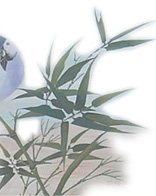|
 LISTEN-TEXT LISTEN-TEXT LISTEN To SHIRLEY SINGS THE POEM LISTEN To SHIRLEY SINGS THE POEM
 Hi, friends, today, I would like to introduce one of the oldest Chinese classical poems Guan Ju for you. This is also one of the oldest love songs from the first collection of poems of China -- Shi Jing. There are 305 poems in Shi Jing. It became a collection of poems from 11 century B.C. to 6 century B.C..The 305 poems were listed in three sorts, names Feng, Ya, Song. Feng listed 160 folks those were created and sung by the common people as oral literature in the different feudal estates. Ya listed the poems from the capital or cities and were written by the literators and be sung in the palaces. Song listed the poems from the temples for admiring the Gods, ancestors and kings. Hi, friends, today, I would like to introduce one of the oldest Chinese classical poems Guan Ju for you. This is also one of the oldest love songs from the first collection of poems of China -- Shi Jing. There are 305 poems in Shi Jing. It became a collection of poems from 11 century B.C. to 6 century B.C..The 305 poems were listed in three sorts, names Feng, Ya, Song. Feng listed 160 folks those were created and sung by the common people as oral literature in the different feudal estates. Ya listed the poems from the capital or cities and were written by the literators and be sung in the palaces. Song listed the poems from the temples for admiring the Gods, ancestors and kings.
All of the poems in Shijing are "Si Yan" poems, that means every line has four words. The poems could be sung at that times, but, now, all of them have been lost. For helping you to remember this poem, I have writen a piece of music to match it and also sang the first part for you.
 LISTEN To SHIRLEY SINGS THE POEM LISTEN To SHIRLEY SINGS THE POEM
I just introduce the first part, because the poem of Shijing were written with very ancient language, even though most of Chinese understand them via the helping of the translation from the ancient Chinese language into the modern Chinese. Guanju is the first poem in Shijing and there is a very important position in Shijing and on the Chinese poetry history. The first four sentences are most famous and popular in China. Many Collections of classical poems for young children chose the first part as No. One. So, I will introduce the first part for you as well.
For helping you to know whole of the poem, I will also translate the other parts and show the original pronunciations to give you for information. :-)
 MAIN MEANING OF THE POEM MAIN MEANING OF THE POEM LISTEN To SHIRLEY SINGS THE POEM LISTEN To SHIRLEY SINGS THE POEM
"Guan Guan", "Guan Guan",
a couple of ospreies are singing on the sandbar.
The gentle and graceful girl,
is my wonderful life companion in my dream.
The long or short banana-plants in the river,
can be collected left or right.
The gentle and graceful girl,
I miss her day and night,
It's not easy to see her once,
The endless missing,
makes me toss about in the white nights.
The long or short banana-plants in the river,
can be collected left or right.
The gentle and graceful girl,
I want to share my friendly via some love songs,
The long or short banana-plants in the river,
can be collected left or right.
The gentle and graceful girl,
I want to share my love with her with all of the instruments.
CHINESE PRONUNCIATION
"Guan1 guan1" ju1 jiu1,
zai4 he2 zhi1 zhou1.
Yao2 tiao2 shu1 nu3,
jun1 zi3 hao3 qiu2.
cen1 ci xing4 cai4,
zuo3 you4 liu2 zhi1.
yao3 tiao3 shu1 nu3,
wu3 mei4 qiu2 zhi.
qiu2 zhi1 bu4 de2,
you1 zai, you1 zai,
zhan3 zhuan3 fan3 ce4.
Cen1 ci1 xing4 cai4,
zuo3 you4 cai3 zhi.
yao3 tiao3 shu nu3,
qin2 se4 you3 zhi.
cen1 ci xing4 cai4,
zuo3 you4 mao4 zhi1.
yao3 tiao3 shu1 nu3,
zhong1 gu3 yue4 zhi.
 Note: Over "u" in the pinyin "nu" should have".." over. Note: Over "u" in the pinyin "nu" should have".." over.
NEW WORDS IN THE FIRST PART
guan1 guan1: (This describes)the sounds of bird
ju1 jiu1:osprey, fish hawk, a kind of river birds. It is said that a couple of the birds are always together. It is as a symbolize of love.
zai4: on, in
he2: river, here points Yellow River.
zhi1:of
zhou1: islet in a river,sandbar
yao3 tiao3 shu niu4: (a) beautiful, gentle and graceful girl/woman
yao3 tiao3: to describe womam's shape looks beautiful
shu1: good, quality is gentle and graceful.
nu: woman, girl
shu1 nu3: a woman who is gentle and graceful
jun1 zi3:gentleman, a man of noble character, it is also honorific title to the others
hao3:good, fine, nice
qiu2:life companion, match
CHINESE CHARACTERS OF THE FIRST PART LISTEN To SHIRLEY SINGS THE POEM LISTEN To SHIRLEY SINGS THE POEM
:
å
ģé
å
ģå
ģ é éļ ïž
åĻæēģäđæīēã
įŠįŠæ·åĨģïž
åååĨ―éã
Ok, that is all for this poem, hope you enjoy it and know the feelings of Chinese from very ancient times. :-) I really hope you enjoy it and remember the new words soon. :-)
 If you have any questions, comments or suggestions, please write to shirley@ebridge.com, you are welcomed. :-) If you have any questions, comments or suggestions, please write to shirley@ebridge.com, you are welcomed. :-)
--Shirley
Written, Edited and Recorded on Sat., Sep 9, 2005
|

